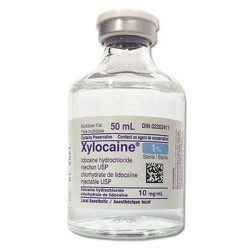Xylocaine (lidocaine) Coupons, Discounts & Cost
Xylocaine (lidocaine) is an amide-type short-acting anesthetic (it works for 10-20 minutes). One way to save money on the Xylocaine retail cost regardless of income and insurance status is to use Xylocaine coupons or discount cards from RXCoupons. Use this Lidocaine coupon at this online pharmacy and receive up to 75% off the sale price.
General information for Xylocaine
Xylocaine (lidocaine) is an amide-type short-acting anesthetic (it works for 10-20 minutes). Lidocaine is basically used on the skin and mucous membranes (for example, during many cosmetic procedures: permanent makeup, depilation, mesotherapy, etc.). It is also used as an antiarrhythmic drug to prevent acute ventricular arrhythmias. Lidocaine is almost always used exclusively for short-term treatment of ventricular arrhythmias or for prophylactic treatment of certain types of arrhythmias.
Lidocaine is effective with all types of local anesthesia. It does not irritate your skin. This substance is quickly absorbed from the upper respiratory tract or oral cavity. It is metabolized in the liver.
This agent has a number of side effects. Doses of the drug may vary for adults and children. There are certain restrictions: treatment with lidocaine may be prescribed only by a qualified physician. The duration of therapy depends on the specific disease.
Xylocaine indications for use
Lidocaine main indications: ventricular extrasystole and tachyarrhythmia (including acute myocardial infarction), ventricular fibrillation. Local anesthesia associated with surgical interventions, painful manipulations, endoscopic manipulations.
How should you use Xylocaine?
Xylocaine injection for anesthesia: use 5 ml intradermally, subcutaneously, intramuscularly (not more than 400 mg).
Xylocaine injection for peripheral nerve block: 10-20 ml (not more than 400 mg).
Xylocaine for epidural anesthesia: epidurally, 10-20 ml (not more than 300 mg).
Xylocaine for spinal anesthesia: subarachnoid space, 3-4 ml (60-80 mg).
It is recommended to reduce the dose of lidocaine in elderly patients, patients with liver diseases (cirrhosis, hepatitis) or those with reduced hepatic blood flow (chronic heart failure). Patients with chronic renal failure may not change the dose.
Xylocaine contraindications
Xylocaine main contraindications: hypersensitivity, WPW syndrome, cardiogenic shock, sinus node dysfunction, heart block, severe liver disease, myasthenia gravis, pregnancy, lactation.
Xylocaine unwanted side effects
Common side effects: headache, dizziness, tinnitus, diplopia, impaired consciousness, shortness of breath, CNS depression, nervousness, euphoria, photophobia, drowsiness, muscle twitching, tremors, disorientation, convulsions, sinus bradycardia, hypotension, collapse, nausea, vomiting, malignant hyperthermia, suppressed immune system, allergic reactions (rash, exfoliative dermatitis, anaphylactic shock).
CNS: CNS depression, nervousness, euphoria, photophobia, drowsiness, headache, dizziness, diplopia, tremor, convulsions.
Cardiovascular system and blood: sinus bradycardia, high or low blood pressure, collapse.
Digestive system: nausea, vomiting.
Allergic reactions: exfoliative dermatitis, anaphylactic shock, angioedema, contact dermatitis (hyperemia, skin rash, hives, itching), burning sensation in certain areas of skin.
Other reactions: malignant hyperthermia, over-excited immune system.
Unwanted drug interactions
Lidocaine should not be used with hypnotics and sedatives. It weakens the cardiotonic effect of digitoxin.
Beta-adrenoblockers increase the risk of bradycardia and hypotension. Norepinephrine and beta-adrenoblockers reduce hepatic blood flow and increase lidocaine toxicity.
Cimetidine increases the concentration of lidocaine.
Combination with novocainamide can cause excitation in the central nervous system and hallucinations.
Xylocaine overdose
Overdose symptoms: dizziness, weakness, low blood pressure, psychomotor agitation, tremor, tonic-clonic convulsions, coma, collapse, CNS depression, respiratory arrest.
Overdose treatment: pulmonary ventilation, oxygen therapy, anticonvulsants, anticholinergics (atropine). Dialysis is ineffective.
Xylocaine special instructions
Be careful with liver and kidney disease, hypovolemia, severe heart failure, malignant hyperthermia.
Children and elderly patients should choose the dose in accordance with their age and physical status.
Lidocaine is not used for local anesthesia before tonsillectomy and adenoidectomy in children under 8 years old.
Store this drug at room temperature in a dry place, away from children.

